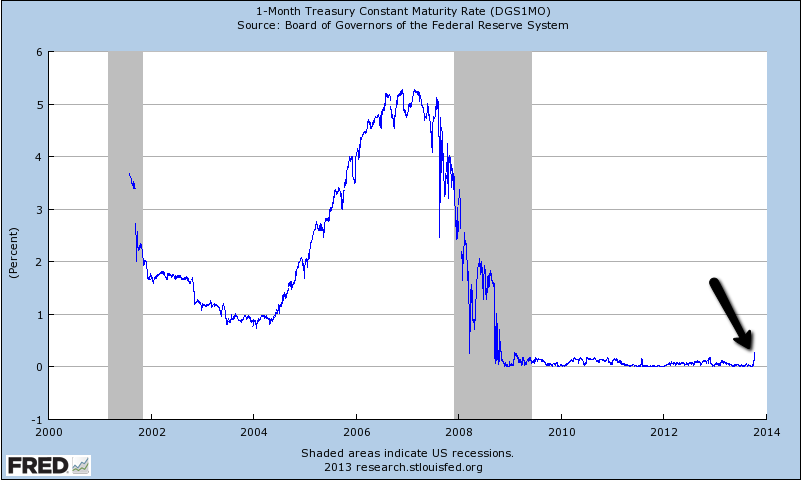Tbill yield spikes to levels not seen since financial crisis
Post on: 10 Август, 2015 No Comment

Getty Images
U.S. Treasury
The one-month U.S. Treasury bill yield spiked to a multiyear high on Tuesday amid mounting concerns that the U.S. may not fulfill its payment obligations to short-term bond holders.
The yield on the one-month T-bill traded as high as 0.322 percent, levels not seen since the fourth quarter of 2008, before settling at 0.273 percent, according to data from Thomson Reuters. The yield stood at 0.083 at the start of the month.
Nervousness over the looming debt ceiling deadline was reflected in the Treasury Department’s auction Tuesday of $30 billion worth of one-month bills at an interest rate of 0.35 percent – the highest one-month federal borrowing cost since October 2008, according to Reuters.
Investors fear that if the U.S. government fails to reach a deal to raise the nation’s debt ceiling before the October 17 deadline – meaning it cannot borrow more money to fund its operations – it could lead to a delay or even default on debt payments due in the next month, say market watchers.
If the U.S. was to default, T-bills are under real threat of not being paid. and the risk premium in the bond yields is reflective of that fear, said Evan Lucas, market strategist at IG. A large portion of demand for T-bills comes from institutional investors, such as money market funds.
Ten-year bonds [by comparison] are relatively unaffected by the shutdown and debt ceiling as coupon payments will flow over the life of the instrument and one or two missed coupons can be recuperated, he added.
Uwe Parpart, managing director, head of research at Reorient Financial said a more likely scenario is that the U.S. government would delay its short-term debt payment obligations, rather than default.

There have been delays on prior occasions. To the extent that there would be a kind of delay it would be technical, there’s no question that they are able to pay, he said, citing the government’s $250 billion in tax revenue each month, compared to its overall debt interest payments of around $25-$30 billion a month.
The inability of the Treasury to pay its bills on time would put the country’s credit rating under threat, Parpart noted.
The question remains whether interest payments can be prioritized over all other payments, if this were done there would be no problem, he said.
However, Greg Gibbs, senior foreign exchange strategist at RBS, believes, it is very unlikely that the U.S. Treasury will miss or even delay payments on government paper.
Nevertheless, the market is acting on the chance that it might, he said.
—By CNBC’s Ansuya Harjani; Follow her on Twitter @Ansuya_H














